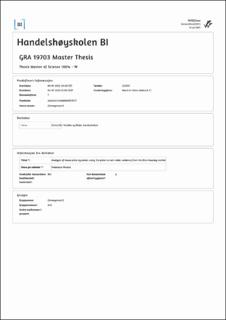| dc.contributor.author | Jakobsen, Daniel Tellaus | |
| dc.contributor.author | Theodorsen, Christian Klingenberg | |
| dc.date.accessioned | 2023-10-19T08:56:31Z | |
| dc.date.available | 2023-10-19T08:56:31Z | |
| dc.date.issued | 2023 | |
| dc.identifier.uri | https://hdl.handle.net/11250/3097497 | |
| dc.description | Masteroppgave(MSc) in Master of Science in Business, Finance - Handelshøyskolen BI, 2023 | en_US |
| dc.description.abstract | This paper seeks to empirically illustrate the value of financial flexibility for European firms during COVID-19. We examine the heterogeneous effects of financial flexibility on performance across Europe, with additional regional and industry-specific effects. We find that highly levered firms (long-term debt) have a more severe stock price decline during the collapse due to the leverage effect. Short-term debt is the most damaging factor for high stock returns during the rebound period. Contrary to previous research, we do not find significant evidence for cash having an effect in Europe during COVID-19. However, within some specific industries, cash has a positive effect. In addition, we do not observe any evidence of operational flexibility being significant during COVID-19. We highlight the importance of estimating heterogeneous effects when evaluating the effects of corporate financial strategies. | en_US |
| dc.language.iso | eng | en_US |
| dc.publisher | Handelshøyskolen BI | en_US |
| dc.subject | finans | en_US |
| dc.subject | finance | en_US |
| dc.title | Was Financial Flexibility the COVID-19 Vaccine for European Firms? | en_US |
| dc.type | Master thesis | en_US |
